 DISCUSSION: John Dante Prevedini leads a discussion about Composers, individuals or collective?, including contributions from David Arditti, Halida Dinova, Robert McCarney and Jane Stanley.
DISCUSSION: John Dante Prevedini leads a discussion about Composers, individuals or collective?, including contributions from David Arditti, Halida Dinova, Robert McCarney and Jane Stanley.
An Unconventional and Complex Score
The first performance of 'Julius Caesar' by Giorgio Battistelli, reviewed by GIUSEPPE PENNISI
The theatre full in all types of seats; employees with kind firmness remembering to cover the noses of those who did not wear their masks well; Superintendent Carlo Fuortes in the atrium to greet the audience; Mayor Roberto Gualtieri (at one of his public premieres) in the royal box as the Head of State was at the inauguration of the Teatro San Carlo in Naples; the presence of Italian and foreign music critics; twelve minutes of ovations and applause after about three hours of show (interval included) - in a nutshell, this is the chronicle of the inaugural evening (20 November 2021) of Teatro dell'Opera di Roma's opera and ballet season. It was an evening that crowned eight years of management during which the finances of the theatre have been, to a large extent, healed. The public has returned to performances and has been greatly rejuvenated, and the opera foundation of Rome has placed itself in international attention, for its wise, calibrated programs between innovation and tradition ... more than Milan's La Scala.
On stage, Julius Caesar, a 'tragedy in music' by Giorgio Battistelli, from the 'historical drama' by William Shakespeare, to a libretto (in English) by Ian Burton, a work commissioned by Teatro dell'Opera di Roma. It is a rare occasion when an Italian opera foundation commissions an opera. (At my age, I remember the times when the main opera theatres had the obligation, in exchange for public funding, to commission one opera each year from composers of what was then called the European Economic Community.) And it is the first time in decades in which an absolute novelty has been proposed at the inauguration of an opera season – an evening in which new productions of known works are preferred, with the possibility of long intervals in which to flutter in evening dress in order to socialize. This is a courageous choice that has rewarded the management and artistic direction of the Teatro dell'Opera, and which I hope other theatres will want to replicate.
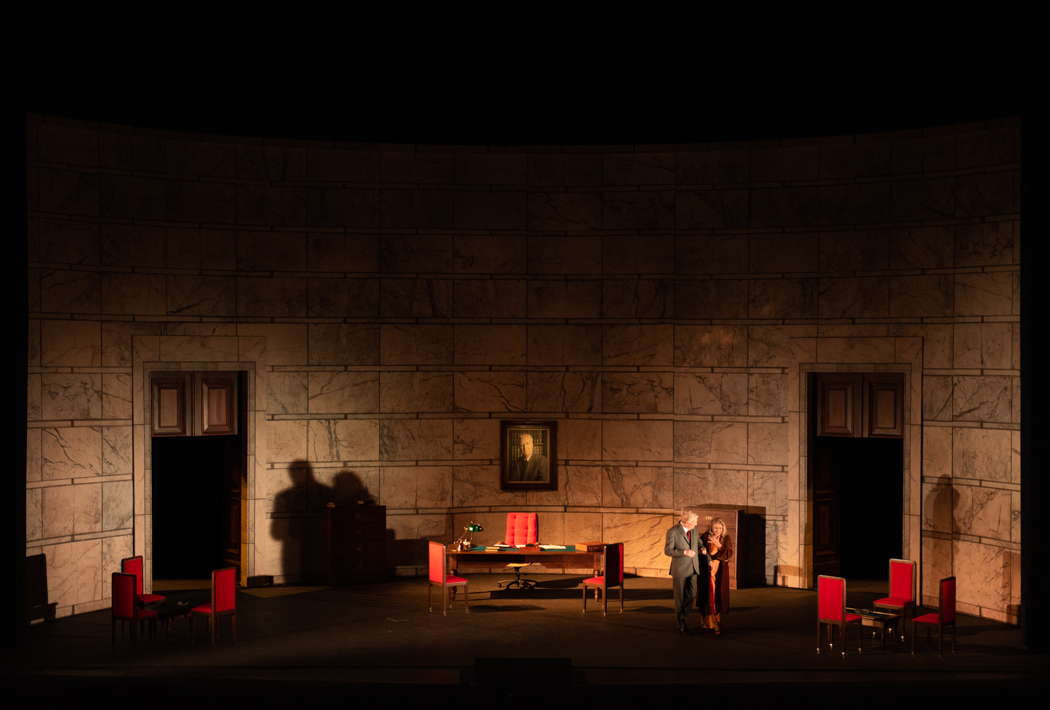
A scene from the Teatro dell'Opera di Roma production of Julius Caesar by Giorgio Battistelli (born Albano Laziale, 1953). Photo © 2021 Fabrizio Sansoni
Julius Caesar marks the second time that Giorgio Battistelli, often inspired by theatrical or even cinematographic works, has started from Shakespeare. The first time was Riccardo Terzo (Richard III) which was first performed in Antwerp in 2005. As then, he has Ian Burton at his side to build a libretto that respects the Bard of Stratford-upon-Avon but differs from it. In short, this is not an operation like that of Benjamin Britten and Peter Pears for A Midsummer Night's Dream, in which Shakespeare's verses are cleverly reduced in number.
There are two main innovations. Doubt becomes the main element of the second part: it torments the conspirators in the Battle of Philippi which, as in Shakespeare's historical drama, is narrated by the protagonists not represented on stage. Caesar's ghost roams the battlefield and exacerbates the intimate tragedy that leads Brutus and Cassius to suicide.
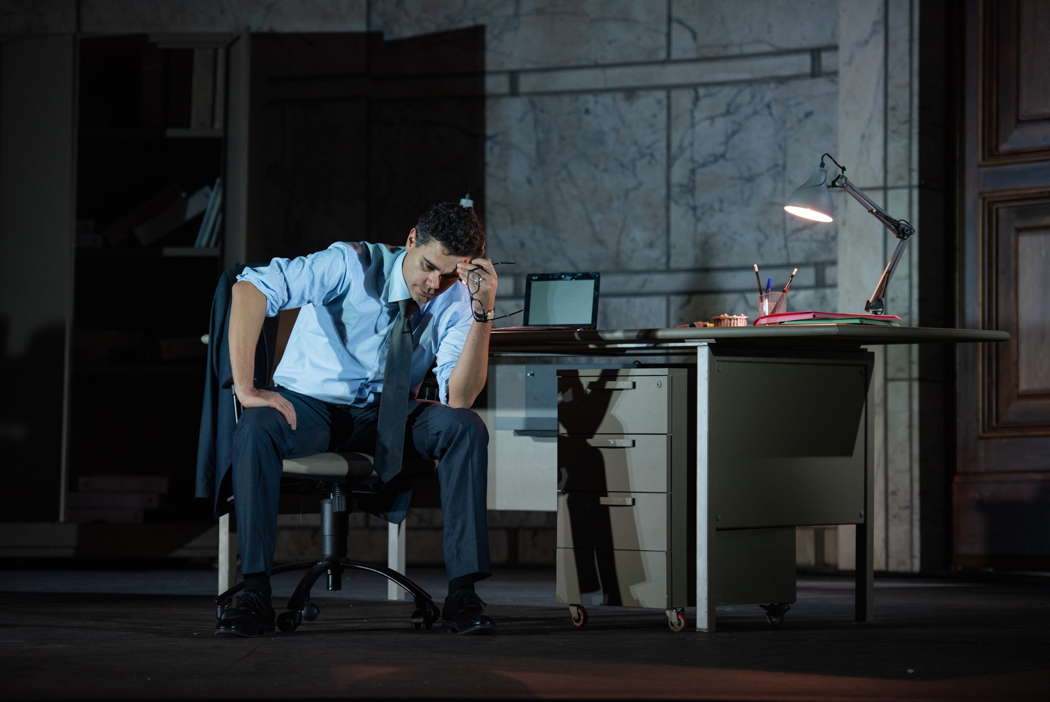
Elliot Madore as Brutus in Battistelli's Julius Caesar. Photo © 2021 Fabrizio Sansoni
What are the characteristics of the musical writing? First, this is a work in which, as in Britten's Billy Budd and, to a large extent, A Death in Venice, there are almost exclusively male voices. There is a brief intervention by Caesar's bride, Calìpurnia, played by mezzo Ruxandra Donose. This is, in fact, a 'tragedy in music' of politics, power, conflicts and war - a tragedy declined mainly to the masculine sense.
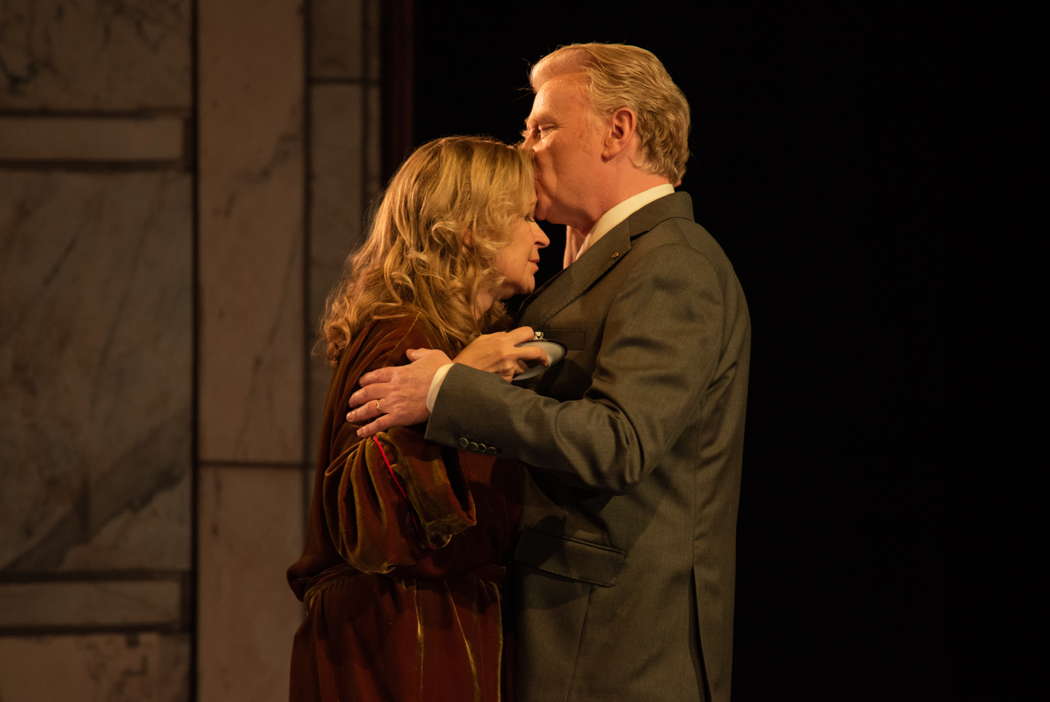
Ruxandra Donose as Calìpurnia and Clive Bayley in the title role of Julius Caesar in Rome. Photo © 2021 Fabrizio Sansoni
At first listening, the score may remind one of Britten, although it is much more complex. It is based on stylistic features, rather than harmonies, and is punctuated by mottos that often take the form of tetrachords, as in ancient Greek music. There are moments of consonance, almost pictorial timbre. The orchestration, which requires large and complex forces, located not only in the pit but also in the two sets of large first tier boxes - often called 'theatre boats' - is very wise and fascinates, as well as the public accustomed to the music of the second half of the twentieth century, even listeners little used to contemporary music. In the choral music, there are references to polyphony through moments with reduced formations, such as eight voices. Vocally, declamation prevails. I would have expected an arioso in the reading of Caesar's will by Anthony (baritone Dominic Sedgwick), but you have it only in the finale, entrusted to Octavian (lyric tenor Alexander Sprague).
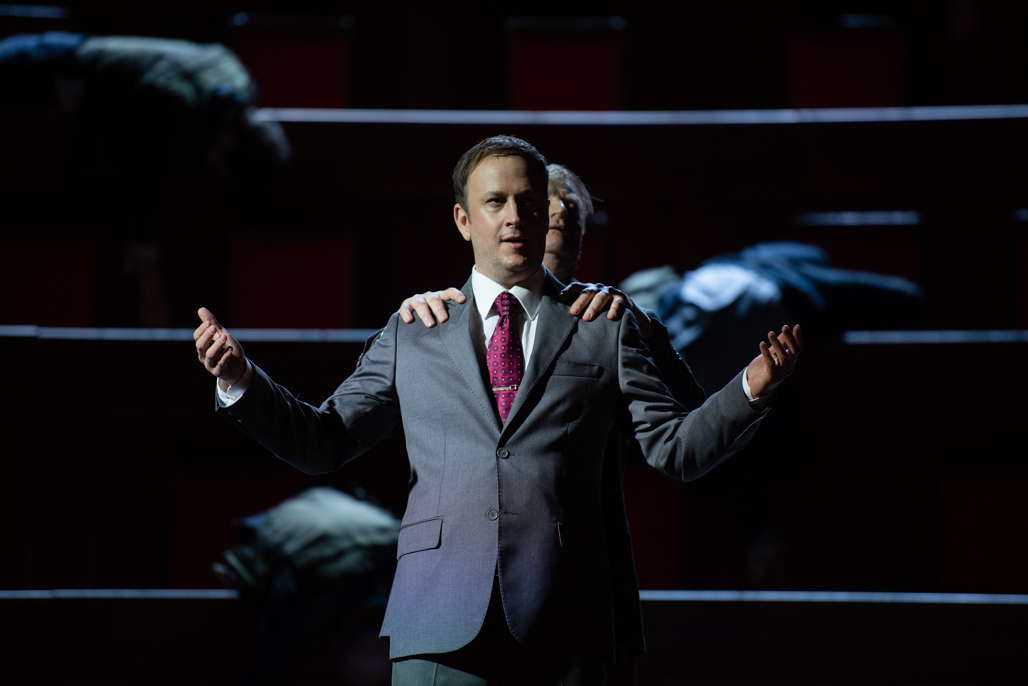
Alexander Sprague as Octavian in Julius Caesar. Photo © 2021 Fabrizio Sansoni
Dark voices prevail: Caesar (Clive Bayley) is a bass, and among the prominent conspirators only Cassius is a tenor (Julian Hubbard), as is to be expected in a tragedy in music.
Teatro dell'Opera di Roma orchestra, conducted by Daniele Gatti at the end of his mandate as the institution's musical director, showed its high level and ability to deal with an unconventional and complex score. The orchestra was, along with the chorus prepared by Roberto Gabbiani, one of the protagonists of the evening and one of the makers of the success.
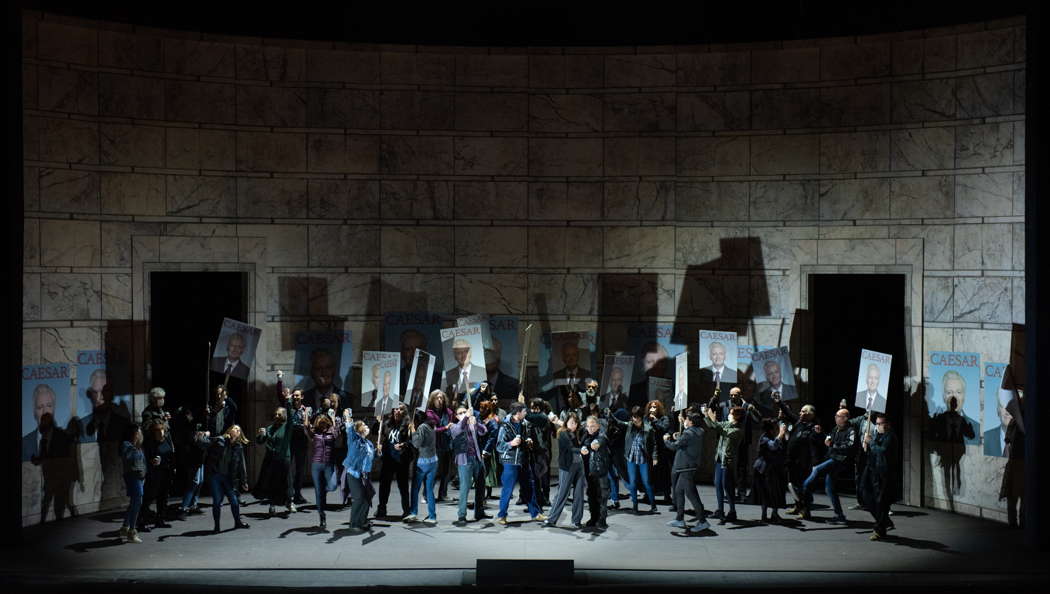
A scene from Julius Caesar. Photo © 2021 Fabrizio Sansoni
Robert Carsen's stage direction places the tragedy in today's Rome; the sets are by Radu Boruzescu, the costumes by Luis F Carvalho and the lighting by Carsen and Peter Van Prael. This was a good idea because intrigue and doubt permeate today's politics, not only in Rome and not only in Italy.
Just one note: on 20 November 2021, in the Senate scenes, sometimes the singers were on benches on high steps, far away from the orchestra. This made it difficult to hear the voices by understanding their words.
Copyright © 23 November 2021
Giuseppe Pennisi,
Rome, Italy

ARTICLES ABOUT CONTEMPORARY MUSIC



